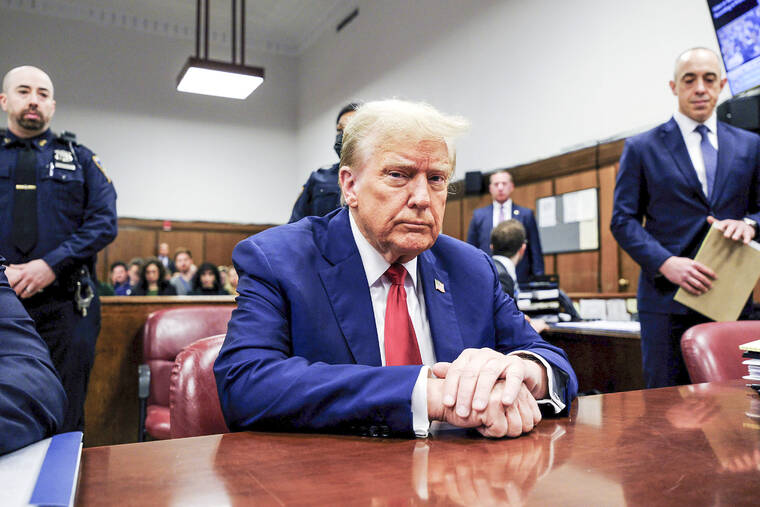David Pecker’s bombshell testimony at hush money trial detailed media manipulation that helped Trump win
NEW YORK — Publishing honcho David Pecker’s testimony this week at Donald Trump’s Manhattan trial opened a rare window on an unholy alliance that helped propel Trump into the Oval Office and spawned a vortex of unflattering stories smearing his political opponents and manipulating news cycles to divert the attention of the American electorate.
On the witness stand just feet from the former president on Monday and Tuesday, Pecker, the former CEO of American Media, Inc., or AMI, detailed how he, together with Trump and his former fixer, Michael Cohen, conspired to exploit AMI’s cadre of celebrity gossip tabloids and magazines to build the Trump brand and influence the results of the 2016 presidential election.
ADVERTISING
Pecker, who told jurors he’d known Trump since the late 1980s, said the trio hatched the alleged scheme at a 2015 meeting at Trump Tower, where he agreed to publish pro-Trump stories while working to hide unsavory ones, taking them “off the market” by purchasing the exclusive rights to ensure they never got published.
The practice, which lies at the heart of DA Alvin Bragg’s case against Trump, is known in the tabloid world as “catch and kill.” The publisher and his longtime friend, “Donald,” as Pecker said he’d always called him, long had a “mutually beneficial” friendship that saw them beef up each other’s bottom line. Pecker’s complicity in pushing pro-Trump stories boosted sales of the National Enquirer while also elevating Trump’s political brand, he testified.
“Donald Trump and Michael, they asked me what can I do and what my magazines could do to help the campaign,” Pecker testified before a rapt jury and frantically typing press corps in the drab 100 Centre St. courtroom Tuesday about the 2015 meeting prosecutors say catalyzed the hush money scheme. Cohen, expected to be the trial’s star witness, would call Pecker to plant the seeds of stories explicitly designed to kneecap Trump’s opponents when they picked up momentum in the presidential race, the publisher testified, and they would “embellish it from there.” Soon after, the stories landed on supermarket shelves and doorsteps across America.
The scheme saw dozens of explosive headlines clog the news cycle in the year before Trump’s win. In one example, Pecker told the court of a story claiming Texas Sen. Ted Cruz’s father helped President John F. Kennedy’s assassin.
“Dylan Howard had the research department take a look at Ted Cruz’s father’s photos, and we matched the photos in every different picture with that of Lee Harvey Oswald, and we matched the two together,” Pecker said. “That’s how that story was prepared and created, I should say.”
That story, as well as many others, including dozens smearing Hillary Clinton, a story claiming Ben Carson left a sponge in a patient’s brain and a “love child” of Marco Rubio, all set off waves of salacious news cycles prosecutors say helped carry Trump to the White House.
Pecker also testified he anticipated women trying to sell stories about a married Trump because he was “well-known as the most eligible bachelor and dated the most beautiful women.” Assistant District Attorney Joshua Steinglass pressed him about Trump’s involvement in the scheme and how his fixer reacted to rumors alleged by a Trump Tower doorman that he fathered out of wedlock — and a Playboy model’s claims they had a yearlong affair. “The boss would be very pleased,” Pecker recalled Cohen saying after the doorman accepted a $30,000 deal for the rights to his story, which Pecker said they later debunked as “1,000% untrue.”
The trial was in recess on Wednesday. Pecker is scheduled to resume his testimony today.





